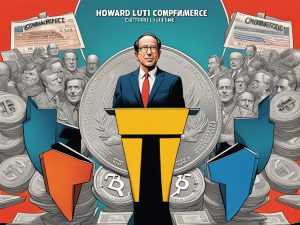Understanding Russia’s Proposed Crypto Restrictions
Russian lawmakers are planning to introduce restrictions on the circulation of crypto assets as early as September 1. The proposed legislation aims to ban the organization of cryptocurrency circulation outside of an experimental legal regime. Here’s what you need to know about Russia’s potential crypto restrictions:
Russian Cryptocurrency Regulations
The new regulations seek to prohibit the establishment of digital asset exchanges and exchangers outside the experimental legal regime. However, crypto assets issued within Russian jurisdiction would still be allowed. This move reflects Russia’s aim to safeguard its domestic economy. Further details include:
- Digital currency miners, mining pools, and Central Bank test projects can continue operating within the experimental legal regime.
- The focus is on restricting the organization of digital asset circulation within the country, rather than a total ban on digital assets.
Rationale Behind the Restrictions
Russian lawmakers believe that cryptocurrencies present a challenge to the Russian ruble by serving as quasi-currencies. To maintain the ruble’s status as the official currency, restrictions on digital assets are deemed necessary. Anatoly Aksakov explains the motivation behind the proposed ban:
“The need for a ban is due to the fact that today cryptocurrency is a quasi-currency that replaces the ruble in the country. But only the Russian ruble fulfills the mission of the monetary unit, so this decision has been made.”
Protective Measure Against Western Sanctions
Anton Gorelkin argues that the ban on organizing cryptocurrency circulation is essential to safeguard Russia’s economic interests. He highlights that allowing a domestic virtual currency infrastructure could expose the country to Western sanctions. The geopolitical landscape and the potential risks associated with cryptocurrencies influence Russia’s stance on the matter:
- Gorelkin emphasizes the importance of the ban as a precautionary measure against external threats.
Flexibility in Regulations
While the restrictions are set to be enforced on September 1, there is a possibility of revisiting these regulations in the future. Gorelkin hints at the potential lift of the ban, focusing on establishing a regulatory framework and protecting the domestic economy in the present:
- The door remains open for reviewing and adjusting the regulations as needed.
Hot Take: Russia’s Crypto Restrictions
Russian lawmakers are taking a firm stance on crypto regulations to protect the country’s economic interests and the status of the Russian ruble. By restricting the organization of cryptocurrency circulation, Russia aims to maintain control over its financial system and mitigate potential risks associated with digital assets.





 By
By
 By
By

 By
By
